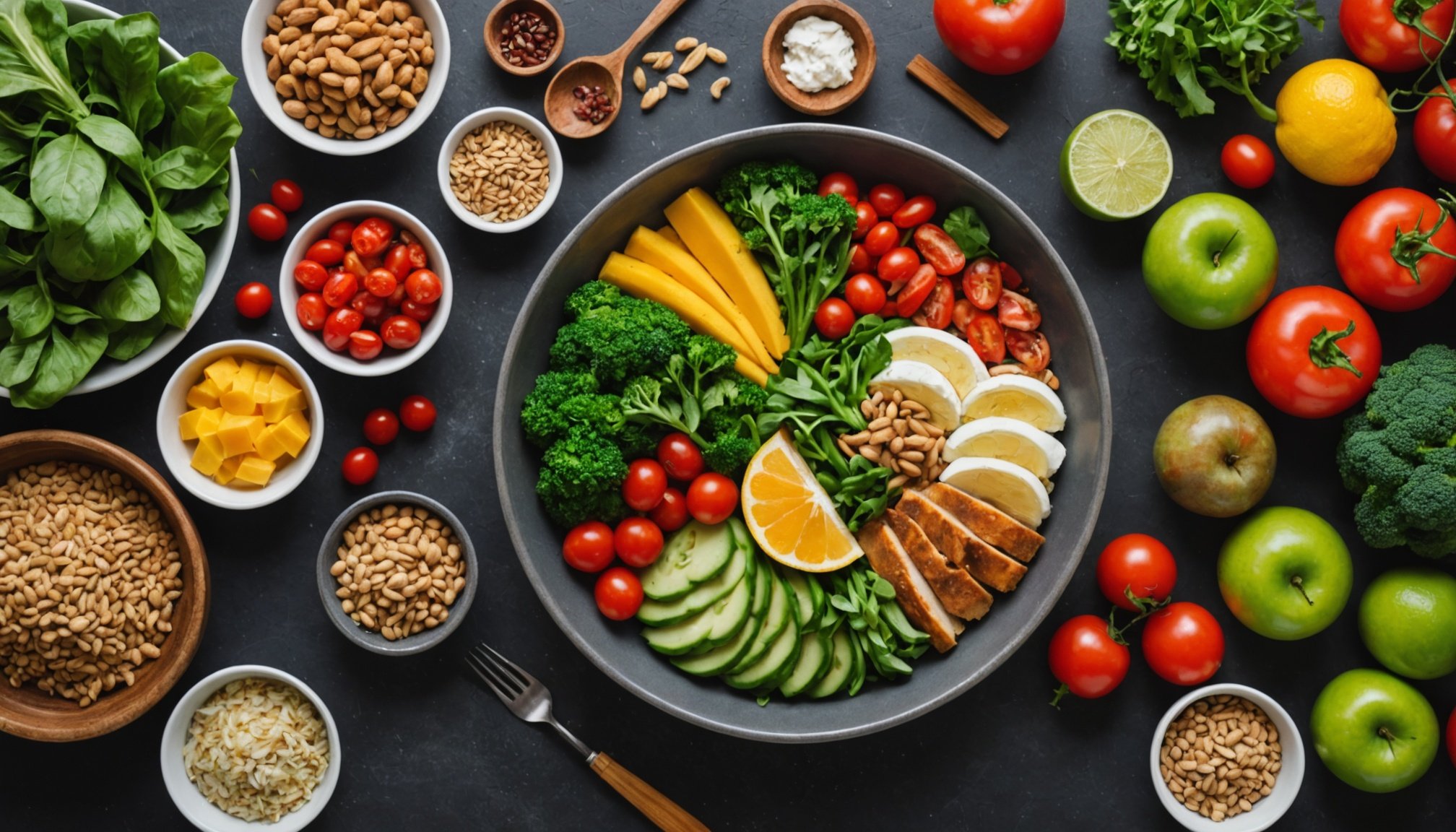Importance of Nutrition During Stressful Times
Navigating stressful periods is a challenge many encounter, and prioritizing nutrition can be a powerful tool in stress management. A healthy diet not only fuels the body but significantly impacts mental health. There’s a strong connection between our dietary habits and mental well-being. Nutritious foods like leafy greens, nuts, and berries can reduce stress levels, offering a natural defence against tension and anxiety.
During stressful times, it’s common to reach for comfort foods high in sugar and fat. However, these can exacerbate feelings of tension. Instead, opting for a healthy diet that includes complex carbohydrates, like whole grains, helps regulate blood sugar, aiding in maintaining emotional stability.
Also read : Essential Culinary Delights for Sustainable Development: A Must-Taste Guide
Encouraging self-care through mindful eating practices can enhance both physical and mental resilience. This doesn’t mean overhauling one’s entire lifestyle immediately but integrating small, manageable changes. For instance, adding a colourful variety of fruits and vegetables to meals can make a significant difference. These dietary adjustments are a proactive approach to stress management, promoting both immediate and long-term benefits. Prioritizing nutrition becomes not merely a survival tactic but a thriving strategy that enhances quality of life during turbulent times.
H2 – Practical Tips for Maintaining a Healthy Diet
Making a switch to healthier eating may seem daunting, but with a few simple nutrition strategies, you can incorporate a healthy diet seamlessly into your life.
Also read : Essential Elements Crafting the Future of the Industry
H3 – Creating a Meal Plan
To start, build an effective weekly meal plan. Begin by selecting a variety of nutritious foods, such as whole grains, lean proteins, and plenty of fruits and vegetables. Balance is key; aim for a colorful plate that includes different food groups. Remember: meal planning helps manage both time and budget. By buying only what you need, you reduce waste and stay on track with your nutritional goals.
H3 – Stocking a Healthy Pantry
Stocking your pantry with essentials like beans, lentils, brown rice, and spices ensures a basis for quick, nutritious meals. Use these staples creatively, for instance, transforming canned tomatoes and spices into a hearty soup. It’s economically savvy as well; pantry staples tend to be cost-effective.
H3 – Quick and Healthy Recipe Ideas
For those on-the-go days, try quick snacks like sliced vegetables with hummus, or assemble a sandwich with whole grain bread and lean proteins. For dinner, think stir-fries or salads that use last night’s leftovers for a nutritious and waste-free meal. These nutrition strategies offer balance, variety, and convenience.
Overcoming Barriers to Healthy Eating
During turbulent times, maintaining a healthy diet can seem unattainable due to various challenges. Identifying these obstacles is the first step toward finding sustainable solutions. Common barriers include time constraints, stress management, and lack of nutrition awareness. Strategies to overcome these include planning meals in advance, which helps alleviate the stress of daily food choices, and seeking out efficient recipes that require minimal preparation.
To keep motivated and accountable, setting realistic goals and tracking progress can be quite effective. This could involve setting a small goal to try one new recipe a week or committing to a colourful plate at every meal. It’s important to celebrate small victories, as they can foster motivation and lead to bigger successes in the long run.
The role of community support is invaluable. Engaging with family and friends about healthy eating initiatives provides encouragement and shared accountability. Additionally, online communities and resources can offer support and keep enthusiasm high.
Building a supportive environment promotes lasting change. These strategies empower individuals to prioritise nutrition, conquer barriers, and enjoy the benefits of a healthy diet even during times of stress.
The Impact of Diet on Mental Health
The diet-emotion connection reveals that what we eat significantly affects our mental wellness. Certain nutrients are crucial for enhancing cognitive function and improving mood. For instance, omega-3 fatty acids found in foods like salmon and flaxseeds are well-known for supporting brain health and emotional balance. Similarly, antioxidants present in berries and nuts help combat oxidative stress, further supporting mental clarity.
Blood sugar levels deeply influence mental states; stable levels are linked to better focus and mood. Consuming complex carbohydrates such as whole grains, which release glucose slowly, helps maintain steady blood sugar levels, thereby promoting mental clarity.
The practice of mindful eating enhances this connection, encouraging individuals to focus on the sensory experience of eating. This not only promotes better digestion but can also help identify emotional triggers for unhealthy eating patterns. Mindful eating involves paying attention to hunger cues and eating with intention, developing a positive relationship with food.
Incorporating these dietary strategies can play a substantial role in mental wellness, focusing on foods that nourish the mind. Making mindful eating a priority embraces a holistic approach to managing stress and improving overall mental health.
Stress-Management Strategies Beyond Diet
Managing stress effectively requires a holistic approach that extends beyond a healthy diet. Incorporating varied stress reduction techniques complements dietary efforts for a balanced lifestyle.
Incorporating Exercise into Daily Routine
Engaging in short workouts, such as brisk walking or a 15-minute yoga session, can significantly enhance mood and energy levels. Exercise and nutrition work hand-in-hand, as physical activity regulates bodily functions, promoting emotional stability.
Finding activities you enjoy is crucial; whether it’s dancing, cycling, or swimming, the key is to remain active consistently.
Mindfulness and Relaxation Techniques
Practicing mindfulness aids in reducing stress by focusing your attention on the present moment. Simple breathing exercises can ease tension within minutes, while regular meditation promotes mental clarity and relaxation. Incorporating relaxation techniques into daily routines, such as stretching or taking breaks to unwind, enhances mental well-being.
Building a Support Network
Social connections are vital for managing stress. Creating a supportive environment involves fostering relationships with family and friends who encourage healthy habits. Joining online communities provides access to shared experiences and resources, aiding personal growth and stress reduction.
Long-term Benefits of Healthy Eating
Adopting a nutritious diet offers profound and lasting advantages. Individuals often experience improved health outcomes, such as enhanced immune function and reduced risk of chronic diseases. These benefits result from a lifelong commitment to balanced food intake. Nutritious eating fosters sustainable nutrition, ensuring consistency in making healthier choices.
Moreover, the consistent practice of healthy eating positively influences overall life satisfaction. Committing to a diet rich in vitamins, minerals, and antioxidants nurtures not only the body but also supports emotional well-being. As energy levels increase, individuals feel more proactive during daily activities.
Setting realistic health goals boosts motivation for long-term success. Small, incremental changes in dietary habits allow for realistic and attainable progress, helping avoid overwhelm. These goals might include incorporating more plant-based meals or gradually reducing processed sugar intake.
Lifelong wellness is reinforced by a sustainable diet, capturing both health and happiness. By prioritizing nutrition, individuals enjoy the combined benefits of physical and mental vigor. The health progress achieved contributes to a fulfilling and balanced life, serving as a cornerstone for lifelong wellness strategies.
Embracing these changes creates a solid framework for a healthier future, emphasizing the critical role of nutrition.

